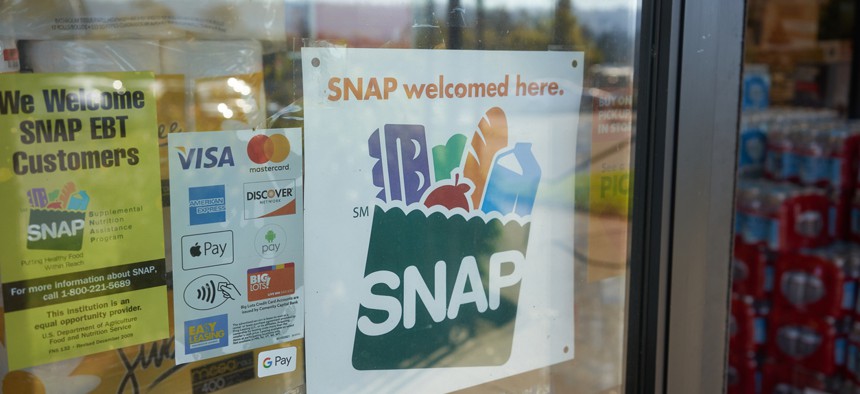What Lies Ahead for State Health and Human Services Programs

Demand has risen in the past year for programs such as SNAP, TANF and Medicaid. iStock.com
COMMENTARY | States and counties will face complex health and human services challenges over the next year.
It’s not a stretch to say that no one was truly prepared for what 2020 would bring with the Covid-19 pandemic and the many challenges it presented. The news we hear about the pandemic these days is more upbeat as vaccination programs ramp up. But the devastating fallout from the coronavirus, in terms of illness, lost lives and economic devastation isn’t over and will leave an imprint on the country for years into the future. The broad question now for public officials is: “What happens next?”
How do we get through this pandemic and to the other side when a vaccine is widely distributed? What does “the new normal” mean to each of us personally and professionally? What is forever altered? How will it affect health and human services programs in the near-term? And how do we recognize and seize the opportunity these challenges present for innovation in the health and human services sector?
Demand Rises for Benefit Programs
The number of citizens needing government assistance grew significantly in 2020, reversing the downward trends we’d seen in the four to five years prior.
Federal data indicated a national increase of about 20% from 2019 to 2020 in the number of households receiving Supplemental Nutrition Assistance Program (SNAP) benefits, sometimes called food stamps. Meanwhile, three quarters of state and county leaders, in a survey Maximus conducted last August, said they had seen SNAP demand rise. This trend is not limited to SNAP. More than 40% of respondents also said they saw increases in applications for Medicaid, Temporary Assistance for Needy Families, which provides cash assistance to households, and housing benefits. Preliminary Centers for Medicare & Medicaid Services data shows increases in enrollments from February through September 2020 for adult Medicaid by 12.1% and Child Medicaid and Children’s Health Insurance Program enrollments by 6.7%. These applications strain the government’s ability to help individuals and families.
While the hope is these application numbers slow in 2021, they’re still likely to outpace pre-2020 numbers, and government agencies must be prepared for that possibility. With some schools still operating remotely, we know there is a critical and escalating need to coordinate services between SNAP and National School Lunch Programs immediately to support expanded Pandemic Electronic Benefit Transfer processes that support food security. States will also need to continue to prepare for higher numbers of enrollees in public assistance programs during the coming years and will need to budget accordingly. At the same time, the federal government will need to provide support to states as they lend support to families in areas like housing, food and employment.
Technologies that Can Help Relieve Demand
Covid-19 has forced health and human services agencies at every level to look at self-service technology for citizens. This can include online portals, virtual agents and increased automation. While telehealth has played a key role during the pandemic, it’s not universally available due to the lack of broadband access in rural areas.
On top of this, many employees will remain remote through at least the first half of 2021, if not longer, adding even more complexity to the pandemic response. While remote work can pose challenges, it also offers great opportunities to reinvent organizational structures and work environments.
But in our survey of state and county leaders, 71% said their top information technology challenge was insufficient equipment to support remote work. Similarly, 44% said their networks didn’t support a remote workforce, an indication of the issues with broadband and wireless networks outside of major metropolitan areas.
States are beginning to draft legislation and work collaboratively with network providers to implement broadband in more rural and inaccessible parts of the country. They are also looking to leverage federal funding and partnerships with vendors to offer innovative digital solutions that address organizational and staff needs as well as optimize the customer experience for citizens.
Looking ahead, it’s critical that any additional federal funding and regulations support state and local governments’ work with vendors as they continue to seek out digital services. Contracting, development and implementation of innovative technology and operations that are cost effective will improve the ability of local governments to meet citizen needs.
Addressing Our Collective Wellbeing
Covid-19 has affected our lives in ways that have left us emotionally drained and mentally exhausted. I understand this personally, as I went more than eight months without seeing my 95-year-old father. When I finally did, there was plexiglass between us. This isn’t unique to my family, and unfortunately, has been our reality for over a year.
A Centers for Disease Control and Prevention report found that at the beginning of the pandemic and the shutdown of many communities in March, there was a 34% increase in mental health pharmacology treatments, an increase of between 24% and 31% for mental health visits for children and 40 states reported an uptick in opioid-related deaths.
As we look ahead, we must consider how we can support citizens with telehealth and other innovative interactions as we balance needs for physical safety and wellbeing. Likewise, governments need to ensure their own employees feel valued and safe—both physically and emotionally—and that they have the tools to do their work remotely or safely in person. Supervisors and management who worry and juggle all these challenges must also get the support they need.
The past year hasn’t been easy for many of us. While we can hope that 2021 will be better, the onus is still on government staff and agencies to prepare for whatever may come next.
Dianne Ewashko is the vice president for U.S. Services at Maximus. To receive a report of the results of the survey Maximus conducted, please contact Dianne at DianneDEwashko@maximus.com.
NEXT STORY: Following Your Gut Isn’t the Right Way to Go





